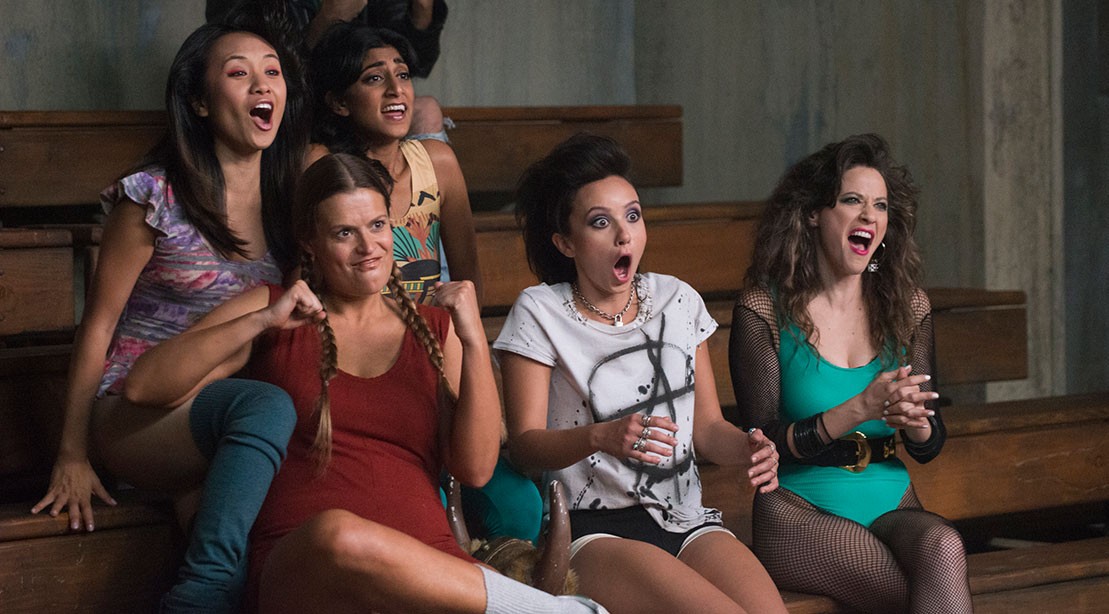‘GLOW’ Coaxes Serio-Satirical Spirit
Netflix Show Plunges into the Dubious World of Lady Wrestling

In the landscape of current television’s stretched narrative canvas and the ever-increasing tension of competing shows and marketing buzz factors, new projects often seize on very specific milieus as a way of standing apart from the genre crowd. And at times, the best time and place for a show/concept to hang out in is the wonderful world of period. Vinyl soaked in the excitable and excessive atmosphere of the music industry circa the ’70s. Last summer’s blockbuster The Get Down, Baz Luhrmann’s account of the birth of Brooklyn hip-hop, basked in both its era genre handiwork and lavish (and expensive) Lurhmann-esque production-number overkill.
On a lower rung of the cultural-entertainment complex ladder (or maybe just a different, laterally placed one), the oddly enticing new Netflix show GLOW coaxes some tasty serio-satirical spirit by plunging into a special niche of the ’80s (1985, to be exact), and the dubious world of “lady wrestling.” Storylines aside, the series loves its wardrobe (with “underwear as outerwear”), coifs (wavy, mullet-ed), music, cars, and other era-centric touches. In some ways, it has the feel of a softcore, suburban variation on Boogie Nights, another squalid tale from the Valley in the ’80s — the “Al Franken Decade.”
But the parallel universe domain of wrestling also accounts for much of the show’s cockeyed zing. Like its male counterpart, this branch of the “sport” feeds off of practiced moves, mock enmity between opponents, and, in the case of the female division, a certain self-acknowledged “cheesecake” aspect. The latter element sparked claims of both sexist stereotyping and feminist empowerment. The series, created by Liz Flahive and Carly Mensch, ushers in a feminine perspective, with its focus on the lives of its characters (usually wrestling with their own personal demons) and regular depth charges of critique for the crass, male-dominated backstory. The 10-episode first season opened last week and is a limited series in a fictionalized treatment of a true story at the center. GLOW, aka Gorgeous Ladies of Wrestling, was an actual TV show in the ’80s, created by wrestling entrepreneur, TV producer, and general American huckster David McLane.
We are led into the story — and the wrestling world — via the aspiring actress Ruth Wilder (Alison Brie, alum of the show Community, and an anchor in this cast), whose dreams of scoring meaningful roles in Hollywood have led her to the microcosmic, and her ultimate transformation into becoming “Zoya the Destroyer.” She is nicknamed “Strindberg” by the salty-tongued and high-minded writer/director/ringmaster Sam Sylvia (Marc Maron), whose slippery attempt at charm is typified by his attempt to woo a reluctant actress into the fold — “You’re like Grace Kelly on steroids.”
Sam is a wannabe B-movie auteur and cult hero whose pretentiously garish script is ixnayed by the trust-fund show-biz kid funding the operation. At a party in his Malibu compound, the kid tells his director to rein it in, as his main interest is a simple equation: “Gorgeous. Ladies. Wrestling.”
Comedy is a driving force in the project, but the dramatic factor entails interpersonal infighting (things get dodgy once the ladies are ensconced in The Dusty Spur motel) and sleazy doings on the business side of the TV. We get winks of self-effacing humor about the kitsch at the core of the enterprise, such as the ripe use of the Thompson Twins’ “Hold Me Now,” which takes on an entirely new meaning in a ring full of holding, flipping, and stunting hokum. We know we’re not in the ’00s anymore when one of the “ladies” facetiously sums up their director by saying, “Who doesn’t trust a man with a moustache fulla coke?” Those are retro words, shivering and shimmying with alluringly cheap exoticism.



